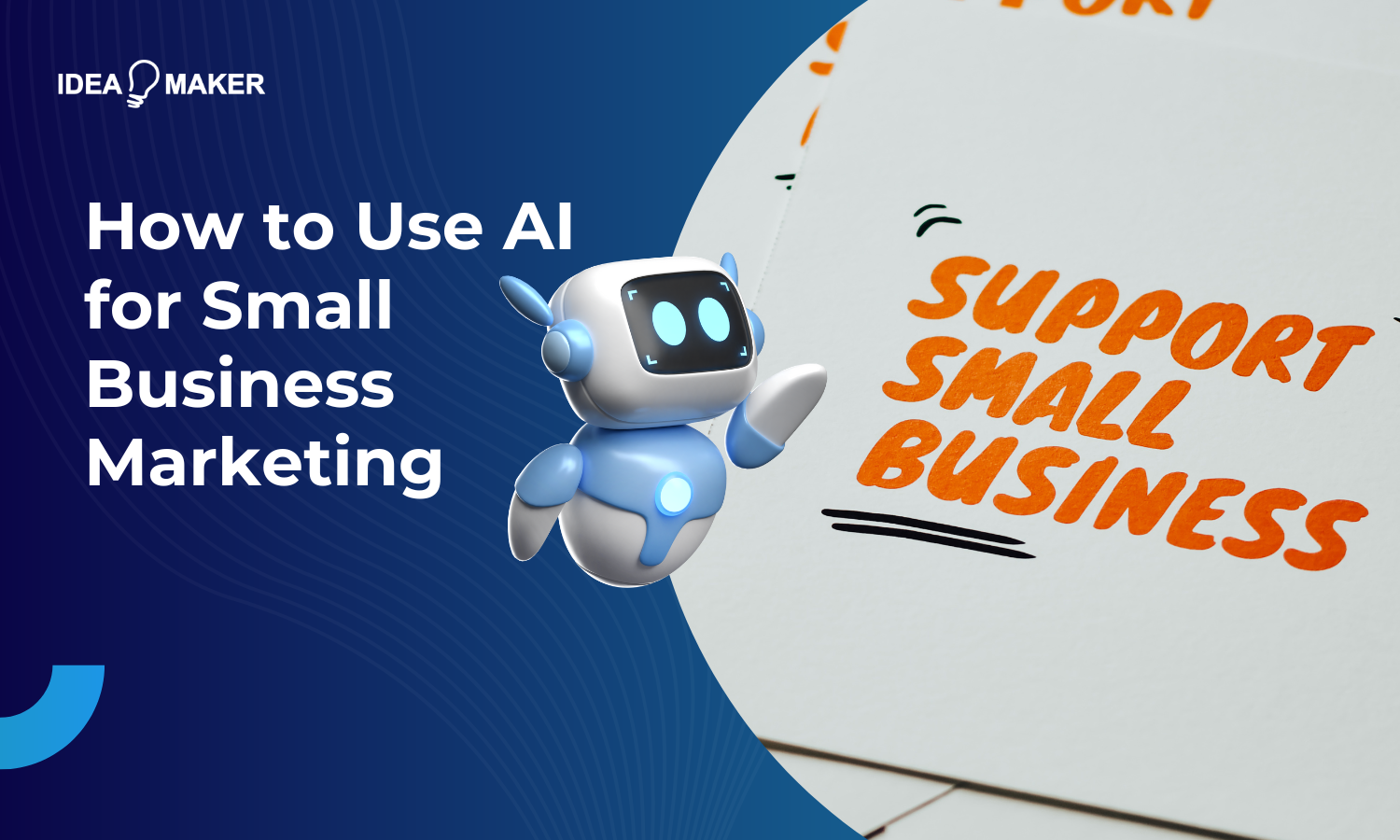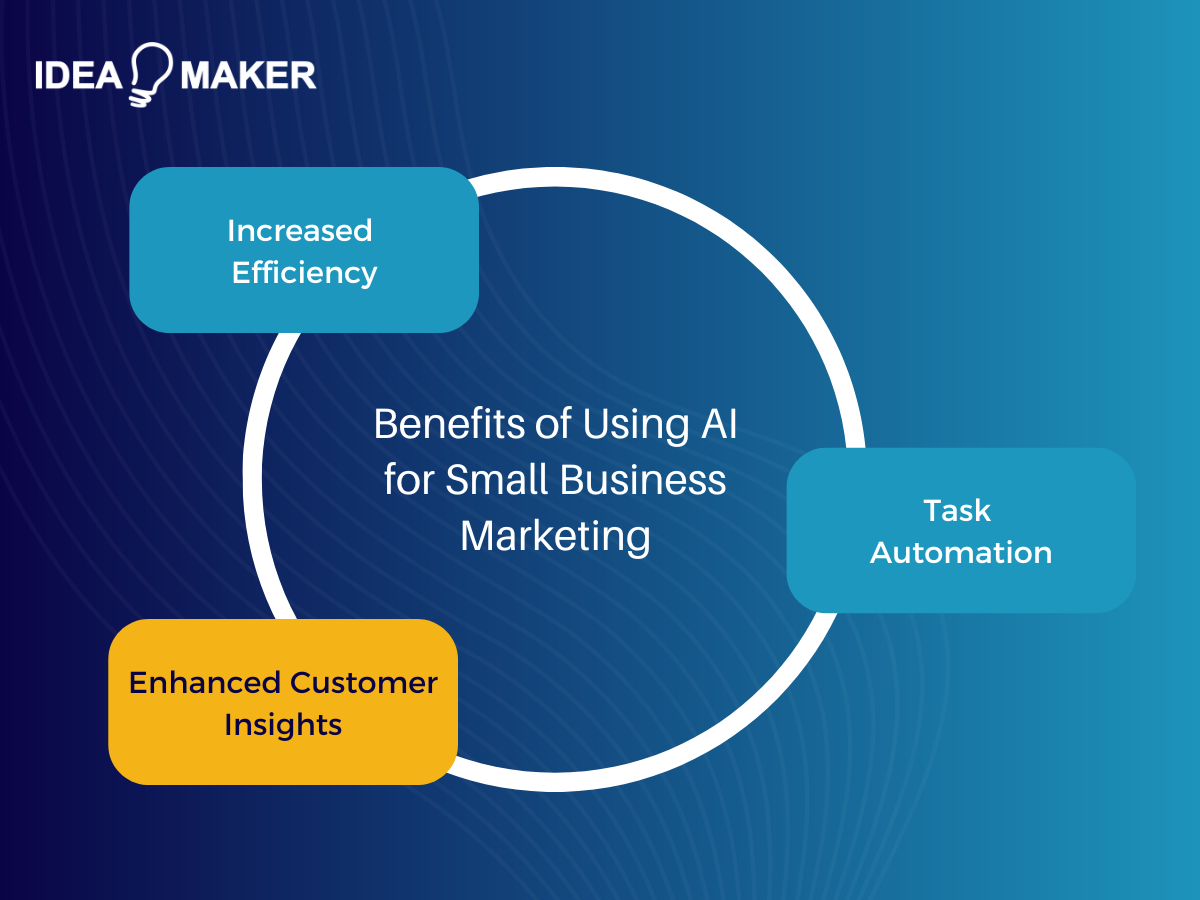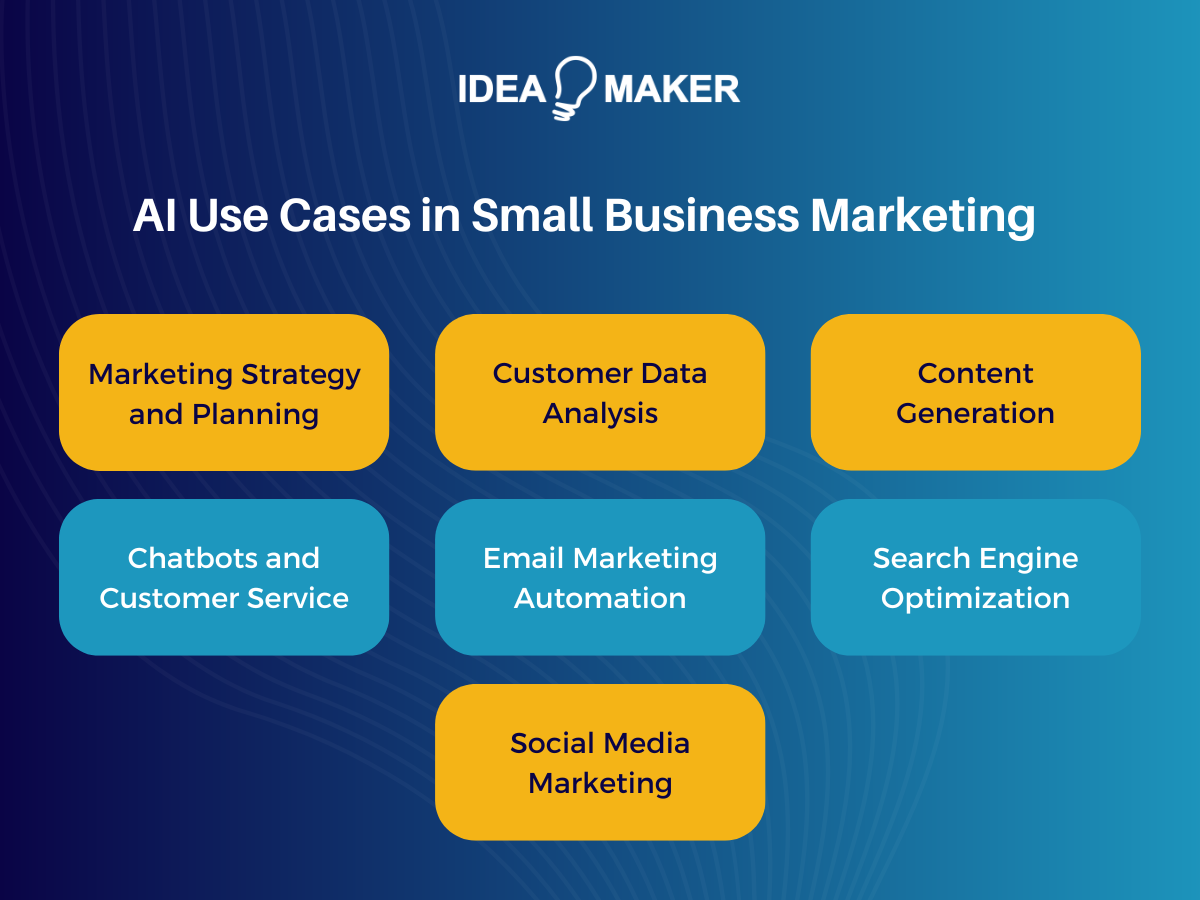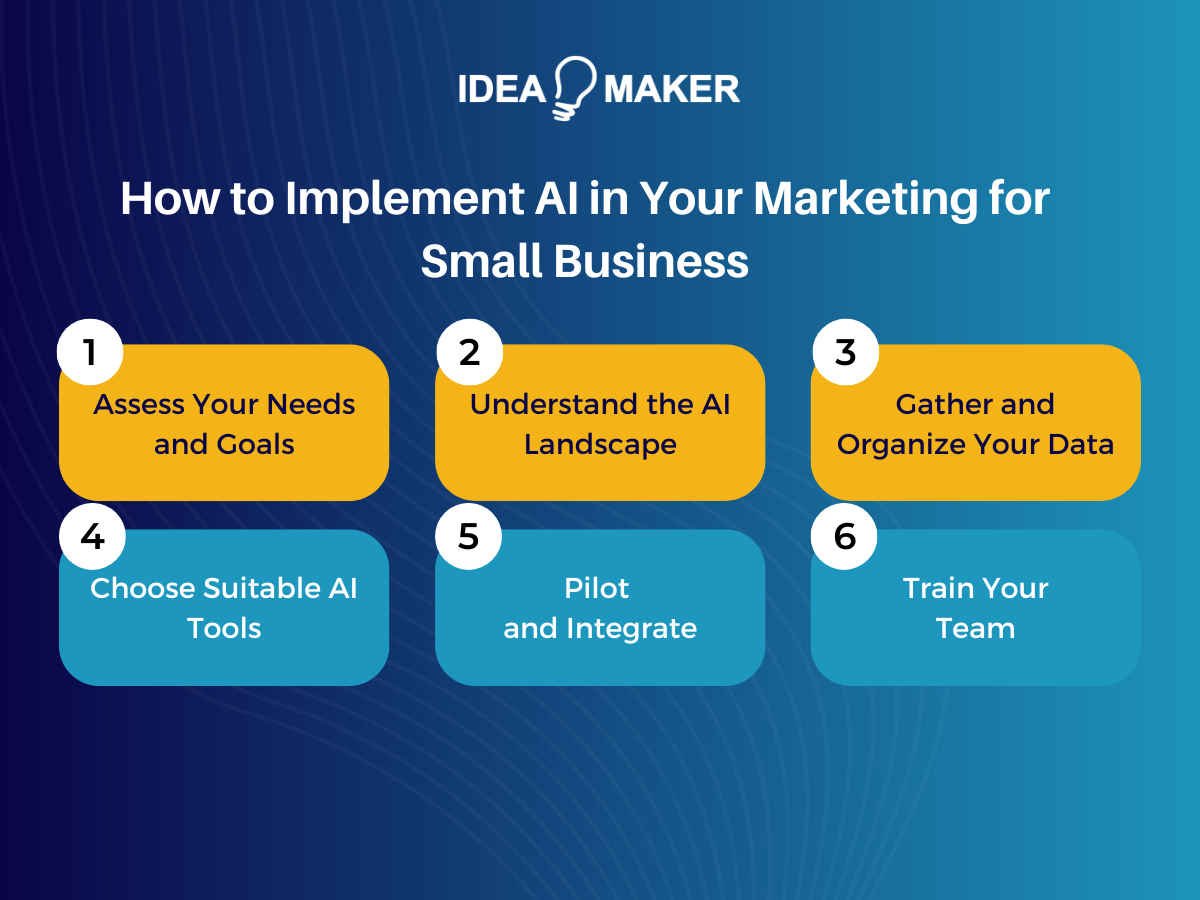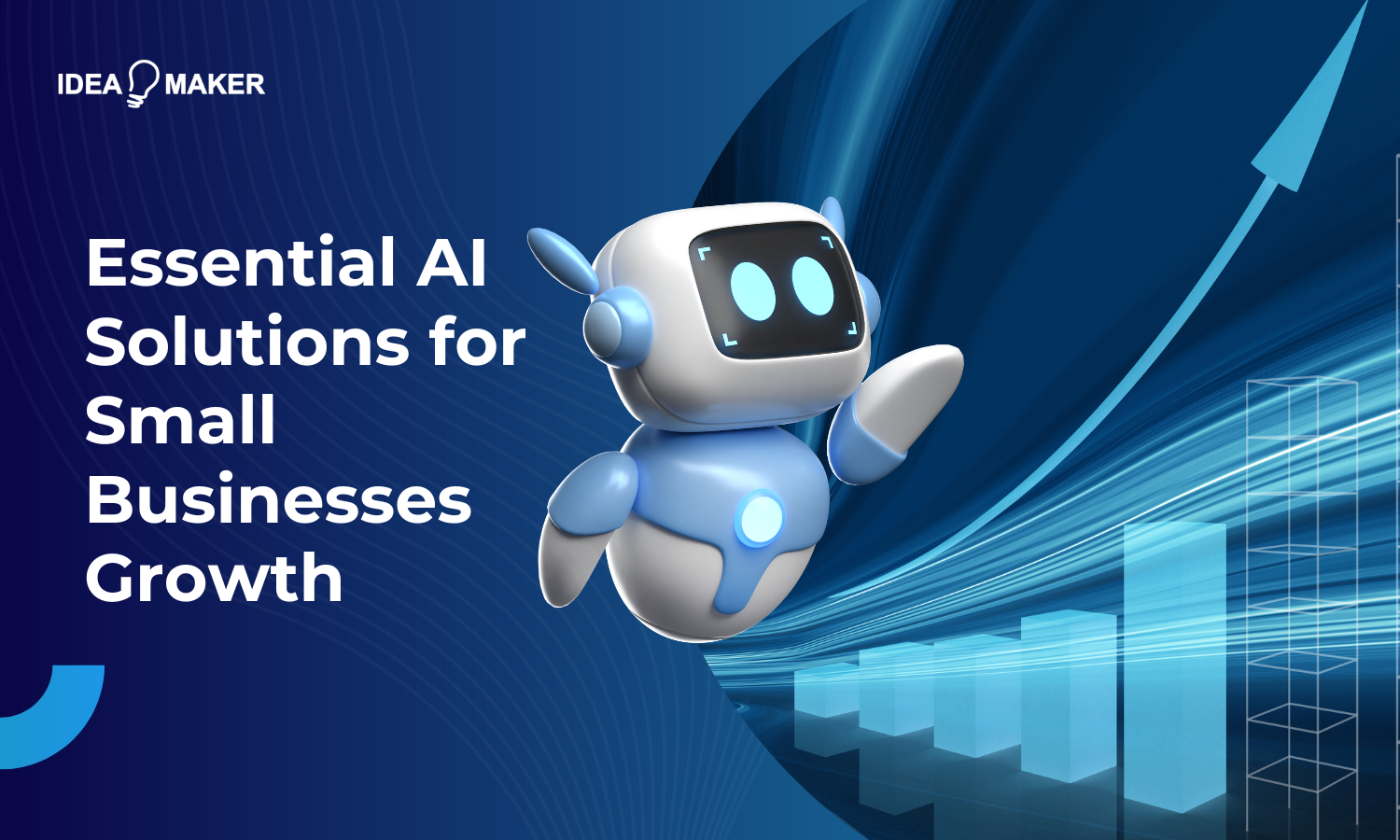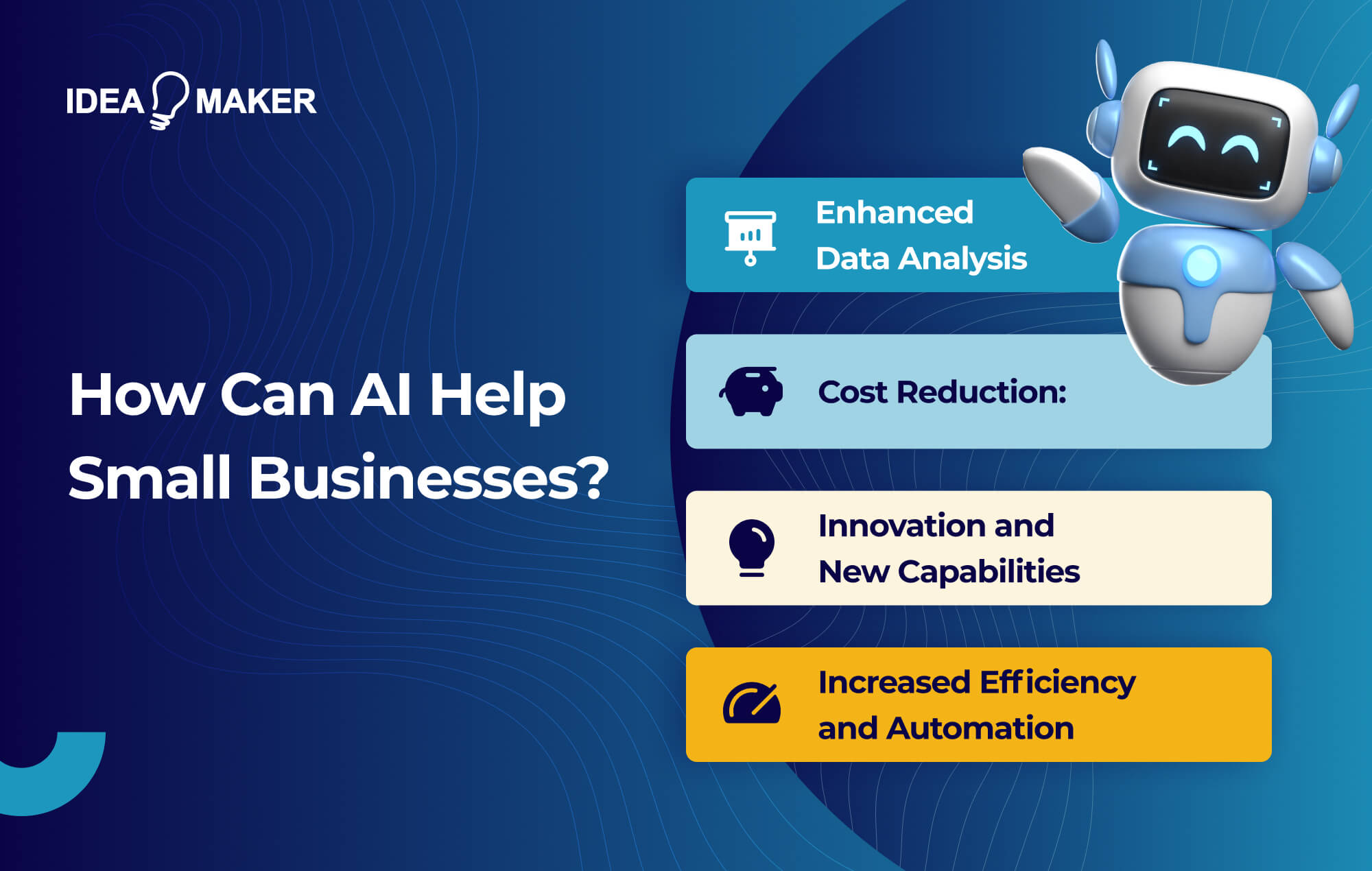Table of Contents
As the economic climate continues to put the pinch on enterprises across industries, it’s small businesses that really bear the brunt of the difficult market conditions. However, continuing developments in AI may be the light at the end of the tunnel, enabling small businesses to remain competitive in an ever-evolving competitive marketplace.
This is thanks to the technology’s wide range of capabilities that provide numerous operational advantages, from streamlined workflows to improved customer service. Many small businesses are also finding that AI can be used to enhance their marketing efforts.
Of course, leveraging AI in your marketing strategies, though beneficial, can prove challenging, especially in terms of determining which AI model to use. As a result, extensive research is critical to ensure a smooth and effective implementation.
Fortunately, at Idea Maker, we are here to help you better understand the technology and how it can help take your business to the next level. That’s why, in this article, we outline everything you need to know about AI marketing, including its benefits, use cases, and implementation process. Keep reading to learn more.
What Is the Role of AI in Marketing?
AI marketing involves utilizing artificial intelligence to plan, execute, or optimize your company’s marketing strategies in order to persuade more customers to buy your products. This practice not only enhances your marketing performance and efficiency, it can also help reduce your operational costs.
For instance, by offering data-driven insights related to your customers’ needs, your business can launch personalized marketing campaigns, ultimately leading to higher sales. On top of this, leveraging AI in marketing initiatives can greatly boost your search engagement, which further increases your overall revenue.
Benefits of Using AI for Small Business Marketing
From improved efficiency to enhanced customer insights, AI for small business marketing comes with a variety of advantages. Let’s now discuss these benefits more in depth, as well as the capabilities that drive them.
Increased Efficiency and Automation of Repetitive Tasks
AI can be used to automate repetitive, time-consuming tasks, such as lead generation, customer engagement, and market research, resulting in enhanced efficiency. Automating low-effort tasks can also help improve productivity, as employees are able to focus on more creative and complex marketing initiatives.
In fact, Nucleus Research found that organizations utilizing marketing automation software can boost sales productivity by about 14.5%. This translates to more customer conversions, which then leads to increased revenue.
Enhanced Customer Insights Through Data Analysis
From accounting software to human resource information systems, the majority of today’s business applications rely on data-driven insights to better understand their customers. This is done by recording each action or change made by the user in real time, generating vast amounts of data for further analysis.
However, with the rise of AI, small businesses now have access to tools previously only available to much larger companies. Natural language processing tools, for example, can be used to mine data from customer service interactions and social media engagement, uncovering valuable insights into consumer behavior and perspectives.
Improved Customer Engagement and Personalized Marketing
One of the most effective uses of AI in small business marketing involves leveraging the insights afforded through data analytics tools to improve customer engagement. By analyzing purchase histories and interactions across your communication channels, AI algorithms can reveal individual buying patterns and preferences, allowing you to create ultra-personalized marketing campaigns.
For example, because the information can help predict which items your customers are likely to be interested in, AI can be used to generate special offers, discounts, and even product recommendations tailored to each customer. This high level of personalization promotes engagement by enhancing the customer experience and encouraging repeat purchases.
AI Use Cases in Small Business Marketing
Now that you have a better understanding of the top benefits of using AI in small business marketing, let’s explore how the technology can be applied to your own marketing efforts. From content generation to automated communications, here are some common use cases that can significantly improve your marketing performance.
Marketing Strategy and Plan
AI can be leveraged to inform your marketing plan by analyzing customer data to reveal trends and preferences, enabling you to target specific groups of customers with tailored recommendations. This will help take your marketing strategy to the next level, as you will be able to speak directly to your customers’ likes and interests.
You can also take advantage of various AI-powered tools to handle simple tasks, such as generating emails, creating social media content, and copywriting. By doing so, you can reduce costs and ease employee workloads, making the technology an extremely efficient use of your budget and resources.
Customer Data Analysis
AI’s ability to analyze customer data offers many powerful advantages, especially in terms of understanding your user base. For example, in addition to uncovering data-driven insights into behavior, preferences, and online engagement, the technology can also analyze the time of day that customers generally open emails.
AI-powered tools can then build a profile for each individual customer, enabling you to implement more effective targeting strategies like sending time-optimized emails. By scheduling emails to be sent at the most optimal time for each recipient, this marketing tactic can significantly improve engagement and increase the likelihood of customers making a purchase.
Content Generation
With 83% of organizations exploring the use of generative AI, the technology has become crucial to ensuring a competitive edge. In fact, many businesses are now leveraging the power of AI to generate marketing content.
For instance, by using content tools such as Copy.ai, Jasper, and Lately, your marketing team can instantly generate everything from social media posts to promotional emails. This content can even be tailored to match your customers’ needs and preferences, further enhancing your marketing efforts.
Not only is AI-generated content quick and efficient, it’s also generally grammatically correct. As a result, using AI for content creation can be a cost effective option for your small business, helping you build an online presence without the expense of a large marketing team.
Chatbots and Customer Service
By investing in a custom chatbot trained on your product data, specifications, order history, and browsing preferences, you can provide your customers with around-the-clock personalized support. This is a highly effective means of enhancing your customer service operations, as the chatbot can instantly respond to queries and resolve issues through natural conversation.
However, if approached with a complex matter that they can’t properly handle, the chatbot will then transfer the customer to a human agent for more in-depth support. Due to this efficiency, chatbots are commonly used on business websites, social media platforms, and messaging apps. Omnichannel chatbots can also be implemented across all company channels, offering consistent, cohesive, and convenient customer support.
Email Marketing Automation
The continuing development of AI technology has led to immense growth in email marketing tools. So, let’s briefly take a look at some different techniques you can use to integrate AI into your email marketing campaigns.
- Predictive Analytics Segmentation: By utilizing AI to group customers with similar characteristics or buying patterns, your business can generate email campaigns targeted to the preferences of specific segments of your customer base.
- Personalized Recommendations: AI algorithms leverage large amounts of data to predict what products customers are likely to be interested in and generate personalized recommendations for each customer.
- Dynamic Content Updates: Instead of sending generic emails, marketers can use AI to generate dynamic content that adapts in accordance to a predefined set of rules. This could be based upon the location or time of day a customer opens your email, providing tailored content updates without human intervention.
- Send Time Optimization: With send time optimization, AI-powered algorithms analyze email behavior patterns to identify when each subscriber generally checks their inbox. Your marketing team can then send emails to individual customers at the optimal time of day, ensuring visibility and boosting engagement.
- HTML Code Layouts: AI can help streamline the process of creating marketing emails by automatically generating HTML code layouts optimized for a variety of different email clients and devices.
SEO and Online Advertising
AI can enhance your online advertising efforts by tracking and analyzing the performance of your content in real time. The technology will then optimize your content to help increase your online presence and visibility in search results.
This practice, known as search engine optimization, will also enable you to generate more leads and improve your customer conversion rate. Leveraging content optimization tools, such as Clearscope, Dashword, and RankIQ, can assist with the SEO process, ensuring your website appears higher in search queries than your competitors.
Social Media Marketing
Social media platforms often employ AI to analyze a wide range of user data, including age, gender, the type of posts they are drawn to, and the advertisements they interact with. This information is then used to create a user profile that the platform’s AI can use to present related content.
As a small business, you too can take advantage of the power of AI to enhance your reach on popular social media platforms. Facebook, for example, even offers a segmentation tool called Lookalike Audience that marketers can use to discover potential customers. For this, the platform’s AI compares data regarding user demographics, interests, and behaviors to create a “lookalike audience” with similar characteristics to your existing customers. You can then hone in on this audience, ensuring your ads target the right users.
In addition to Facebook’s Lookalike Audience, there are numerous tools that can be used for effective social media management. These include Buffer, Brandwatch, Hootsuite, and Agorapulse, all of which offer varying levels of AI integration, making the process of creating and scheduling social media content a breeze.
How to Implement AI in Your Marketing for Small Business
While it may seem like a daunting task, artificial intelligence can be implemented into your small business marketing plan in a few simple steps. To give you a better idea of what to expect at each stage, let’s walk through this process together.
Step 1: Assess Your Marketing Needs and Goals
When implementing AI into your marketing plan, the first step is to clearly identify your main objective. For example, do you want to improve engagement through social media content or generate better-targeted marketing emails? The answer here will ultimately help inform your future marketing decisions, providing you with the information needed to determine whether you can integrate AI into any of your existing processes.
Step 2: Understand the AI Landscape
To get a better grasp of the AI landscape, it’s important to understand that artificial intelligence covers a vast range of tools, applications, and solutions. Most AI systems, however, generally fall into four distinct categories:
- Intelligent Process Automation: Intelligent process automation, as the name suggests, refers to the practice of leveraging AI and other advanced technologies to manage and automate digital processes. For example, AI can be combined with technologies such as business process automation, digital process automation, and robotic process automation to perform repetitive tasks and enhance employee productivity.
- Artificial Intelligence: Artificial intelligence is an extremely broad term, depicting the use of computer systems to mimic human intelligence. This includes any field that falls within the scope of automation and machine learning, such as computer vision, large language models, and natural language processing. With AI’s human-like intelligence, businesses can greatly improve various activities, especially those related to decision making and pattern recognition.
- Machine Learning: Machine learning is a branch of artificial intelligence that enables AI systems to recognize and analyze patterns in data sets. The systems can then make data-driven recommendations or predictions, improving its accuracy over time as it leverages new data. This adaptive technology encompassesreinforcement learning, semi-supervised learning, unsupervised learning, and supervised learning.
- Deep Learning: A subset of machine learning, deep learning uses neural networks to allow digital systems to make decisions and solve problems like a human would. Neural networks are essentially a set of algorithms capable of learning from data to recognize patterns and identify specific features without explicit programming.
Step 3: Gather and Organize Your Data
Identifying the correct training data for your AI is essential, as your software will only be as good as your training data. However, the data you use to train your AI model ultimately depends on what role you want the technology to play in your marketing plan. As a result, clearly defining the specific functions you intend the system to carry out is required in order to ensure optimal results.
If its main purpose is to provide personalized recommendations, for instance, then your AI will need to have data on all products on your website, how they relate to each other, and whether they fall into similar categories. This will allow the AI system to properly suggest items related to customers’ browsing histories.
Step 4: Choose Suitable AI Tools
After you’ve thoroughly assessed your marketing objectives and gathered relevant data, you can begin identifying which AI tools will best suit your needs. This will involve extensively researching various tools and applications that can help you achieve your overall goals within budget.
For example, if your goal of using AI is to free up your customer service staff to focus on more complex tasks, then a custom chatbot would likely be your best option. Alternatively, for assistance with social media posts, generative AI tools like Copy.ai, Jasper, and Lately might prove more useful.
Step 5: Pilot and Integrate
Once your marketing AI software has been developed and thoroughly tested by your software development team, you will need to pilot it to see how it works in real life. This will involve selecting an appropriate testing group, ensuring you have the participants needed to provide sufficient feedback.You will also need to develop an onboarding plan before moving the pilot group from your existing software to your new AI system.
Using this group of participants, you can then put your new AI software through its routine use case, running it for a specific pilot period. Once complete, you will need to be sure to gather participant feedback and identify and resolve any pain points and challenges with the system. Additional iterations of this process should be conducted until you are satisfied with the software’s performance.
Step 6: Train Your Team
Once the new AI software has been integrated, your team will need to learn how to properly use the system prior to the it’s official launch. This can be accomplished by providing a robust training program for all members of your staff who will utilize the software on a regular basis. By equipping team members with the skills needed to efficiently and confidently use the AI system, you will be well poised to enjoy a seamless deployment.
Implement AI Into Your Marketing Workflow With Idea Maker
At Idea Maker, we understand that implementing AI into your marketing strategies can seem like a daunting task. That’s why we’re here to help. Our experts are dedicated to walking with you every step of the way to develop high-quality AI software tailored to your small business. Set up a consultation with us today to learn more about how our services can enhance your marketing plan.
